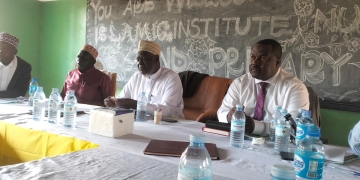 Kampala — A tireless free spirit who consistently found ingenious ways to navigate even the most challenging circumstances, always giving his all to every assignment. A man whose service to Uganda truly embodied commitment.
Kampala — A tireless free spirit who consistently found ingenious ways to navigate even the most challenging circumstances, always giving his all to every assignment. A man whose service to Uganda truly embodied commitment.
Born on Ssese Islands to Buganda chief, Donald Ssekatawa and Ann Sekatawa, it was apparent that the affable young man was destined for greatness. In 1978, Lwanga joined Makerere University to study political science, where he studied alongside future army commander, Mugisha Muntu.
At Makerere, Sserwanga Lwanga was actively involved in student and national politics. It was here that he met many of his future NRA comrades, who came to be known as the “intellectuals,” including Benon Biraaro, John Kazoora, Tumukunde, Sande Mukuru, Abel Karegyesa, and others.
In May 1981, Sserwanga Lwanga joined the PRA, a precursor to NRA. At the time, the PRA was a force of approximately 200 men. By January 1982, Sserwanga Lwanga was serving as a political commissar and intelligence officer before being appointed as NRA’s Deputy Chief Political Commissar in 1983.
Legend has it that no NRA fighter walked faster or more miles than he did during the bush war. In one incident, Lwanga walked 72 miles in one day via enemy territory to collect drugs for a colleague who had been diagnosed with river blindness, an act that ultimately saved his sight.
Feats like these earned him the nickname “Horse.” But it wasn’t his only wartime name. His favorite military jacket earned him another nickname, “Galimpitawa.” Whenever his comrades teased him about it, his witty response was Galimpitawa, a reference to its supposed bulletproof nature.
In 1984, Sserwanga Lwanga was briefly the acting CO of Task Force Black Bombers, a covert outfit that operated deep in enemy territory under Gen Matayo Kyaligonza. In September 1985, Sserwanga Lwanga was summoned to Nairobi to attend peace talks between the Ugandan government and NRA.
However, on his way to Kenya, he was arrested at the border and detained by security forces. Protests from the NRA delegation yielded no fruit until one month later, when the NRA executed a daring plane hijacking that ultimately resulted in his release.
In 1986, Sserwanga Lwanga was briefly deployed as Northern Brigade Commander before serving as the PPS to the President (1986-1989) and NRA Chief Political Commissar (from 1989). In April 1994, he was elected by the Army Council to represent the Army in the Constituent Assembly.
In the CA, Sserwanga Lwanga was instrumental as both a Commissioner and delegate. He stood out as an avid debater and tireless contributor, often working long hours into the night. Not surprising for a man who turned up to his wedding ceremony straight from a public engagement.
In 1996, Sserwanga Lwanga passed away in a hospital in Hamburg, Germany, where he had been flown for medical treatment. Sserwanga Lwanga Secondary School in Kalangala district was established in memory of his legacy. Today marks exactly 29 years since his passing.







